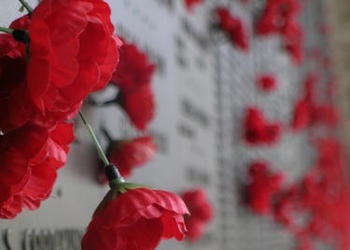What Can We Learn From War?

Memorial Day in the United States fell on this past Monday, May 27, but a month ago here in Australia and in New Zealand the war dead were remembered on ANZAC Day, April 25. ANZAC was the name given to the Australian and New Zealand Army Corps who landed on the morning of that date on the Gallipoli Peninsula in Turkey in 1915 during the First World War.
Like Memorial Day, Anzac Day calls to mind more than just that event in WWI. It was created to remember all who have sacrificed their lives in war. An ANZAC Day ceremony often includes hymns, prayer, the laying of wreaths, the Last Post (A bugle call that is sounded at every soldier’s funeral) and a period of silence. This year was the largest attendance recorded for the ceremonies across the nation.
One nation’s hard fought lesson
I am reminded of the historical origins of this day whenever I drive down a street called Anzac Avenue, which currently shows a painting of the landing of the boats at dawn at Gallipoli.
That battle at Gallipoli had much meaning because it caused Australia to find its identity. The campaign was a failure, with over 10,000 Australian lives lost, but because of the strength and courage shown through the campaign, Australians found out what they were made of and drew strength from it.
It is said that every nation must go through a test that will either strengthen or dishearten those that come afterwards.
God himself experienced the pain and heartache of war and battle before anyone else during the rebellion of Satan (Revelation 12:7-9). He can empathize with the sadness involved.
Who will defend us?
When the nation of Israel chose to live by the sword (and suffer by it) God, at certain times and places, gave extraordinary strength to those who defended His chosen nation. King David could kill a bear and a lion with his bare hands (1 Samuel 17:34). Samson demolished the pagan temple of Dagon with the God-given strength of his muscles against the pillars of the structure (Judges 16:23-31). David’s mighty men fought bravely in many ventures (1 Chronicles 11). These stories dealing with war are recounted in the Bible for our benefit. We learn how God can provide for the defence of those He loves.
We can also draw lessons from the unbelievable courage shown by soldiers of more recent times. However, our cause, when we commit our lives to God’s way of life, is the defence of a spiritual nation, God’s future Kingdom (John 18:36).
With Jesus Christ’s crucifixion and resurrection at Passover, and the gift of God’s Holy Spirit on the Day of Pentecost in 31 A.D., God began to work with a new nation, no longer a physical nation, but a spiritual nation of Israel drawn from many ethnic backgrounds to become the Church of God. In the course of time, everyone will have a chance to understand God’s ultimate eternal plan for humankind.
Defending our spiritual homeland
We are made very aware through God’s word that there is an even bigger picture, a more difficult war with the spiritual realm and our personal focus should be putting on the spiritual armour of God (Ephesians 6:13-17).
In one incident during Jesus Christs’ ministry a centurion put on the shield of faith and asked Jesus to heal his servant (Matthew 8:5-13). Christ marvelled and praised the centurion for apply his understanding of authority, learned through his military experience, to have faith in Jesus’ authority and power to heal.
When we consider the soldiers that have lost their lives, it is important to remember that even though we fight in different theatres of war, ours being spiritual, we can still admire the courage, self-discipline, strength, and sacrifice it took to go into battle. It should stir in us the diligence to prepare ourselves for the spiritual battles we have to face in this life as we strive to stay faithful to God.
